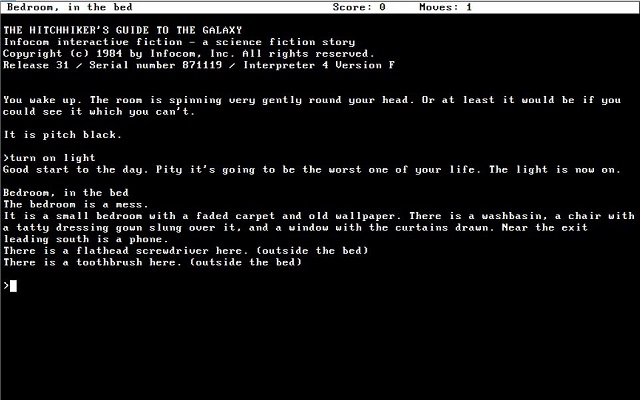
My mom, in her attempts to get me to read more, always said that books are better than TV or playing computer games because books help stimulate imagination. You imagine what the universe the book is set in looks like. Obviously, she had her way and it wasn't until I moved out that I managed to get started with gaming, and that was when I discovered text-based games.
Had I known that these games existed back in the day, I would have made the best case for them, got my mom to see that they also foster critical thinking and really help develop key spatial visualisation skills.
Here are four text-based games that are definitely worth playing if you're in a mood to think instead of just pulling the trigger and hoping for the best.
The Hitchhiker's Guide to the Galaxy
This game I discovered when the BBC celebrated the game's 30th anniversary by releasing it with a graphical interface. Compared to a port of the original from 1984, which can be played here, the added visuals are a relief, but I couldn't help wonder whether my mom would approve. The game follows the same series of events that a book follows and was in fact co-written by the author himself. Be prepared to be killed, a lot, and save at every chance you get. It also helps if you have a book with you as you play the game.
The language the game employs to move the narrative along is exactly what you'd expect from a book, and unlike the book where the reader is omniscient, in the game, you play as Arthur Dent and when you're lying down in front of a bulldozer, for instance, you're sadly not privy to the conversation Ford Prefect has with Mr Prosser.
I recommend playing the ported version if you're at work, so as not to arouse suspicion.
The Victorian Detective Series
It's Victorian England and you play a Scotland Yard detective who has an eidetic memory, knows everything there is to know about and luck for you, you don't really have to worry about split-second decisions for wibbly-wobbly time-y wimey reasons.
Actually the eidetic memory is a result of being able to review past events when you wish to with the Ctrl+F command, the game makes up for your personal lack of knowledge and because it's turn-based, you can think about your next move for as long as you like.
The game also incorporates the detective's inner monologue, which fills in the finer details, while also posing as a stand-in for the omniscient, omnipotent narrator.
Written and illustrated, rather crudely, by Peter Carlson, the game requires you to think logically, putting the clues you've gathered together to arrive at a conclusion and choosing the course of action that is most appropriate. You lose a point for every incorrect action and gain a point if you've done your homework right. Unlike the Hitchhiker's Guide to the Galaxy, this game doesn't require users to type out their next course of action and the game certainly moves along irrespective of whether what you've deduced is correct or not.
You can play the first game here and find the rest here.
A Dark Room
A game that's Age of Empires meets any other adventure type game mentioned above begins in a little room that as you progress, expands into a village and more. You build houses, trading posts, workshops and as your village grows, you get more people coming in. As you continue playing, the game begins to open up revealing to you what the game has in store. Instead of narrating the story directly, the game uses the environment to give you hints about the world you live in.
The kind of game you leave running in a tab all day long, the game becomes progressively more difficult as you continue playing. The app has been consistently one of the best-selling games on the AppStore. Sadly, Android users will have to stick to playing it on the desktop. You can play the game here.
Lifeline
The only game in this list that required purchase and the only game that can't be played on your browser, Lifeline is about Taylor, a science intern who is perhaps the sole survivor of a space mission gone wrong, and you are the only person who have help. You pick up his radio transmissions and for each question, you have two responses. The game pans out depending on your interactions with Taylor and you decide whether he lives or dies.
As the game unwinds, you receive notifications through the day. If Taylor has to go to a particular location and estimates that it should take him a few hours to get there, expect his next message to come you when he reaches the point as predicted. You can also put off responding to Taylor and catch up with him at your leisure.
The Lifeline series has expanded to include two more titles, including a direct sequel to the original game. The games are written by Dave Justus, who also wrote Wolf Among Us and work on Android as well as iOS devices.















